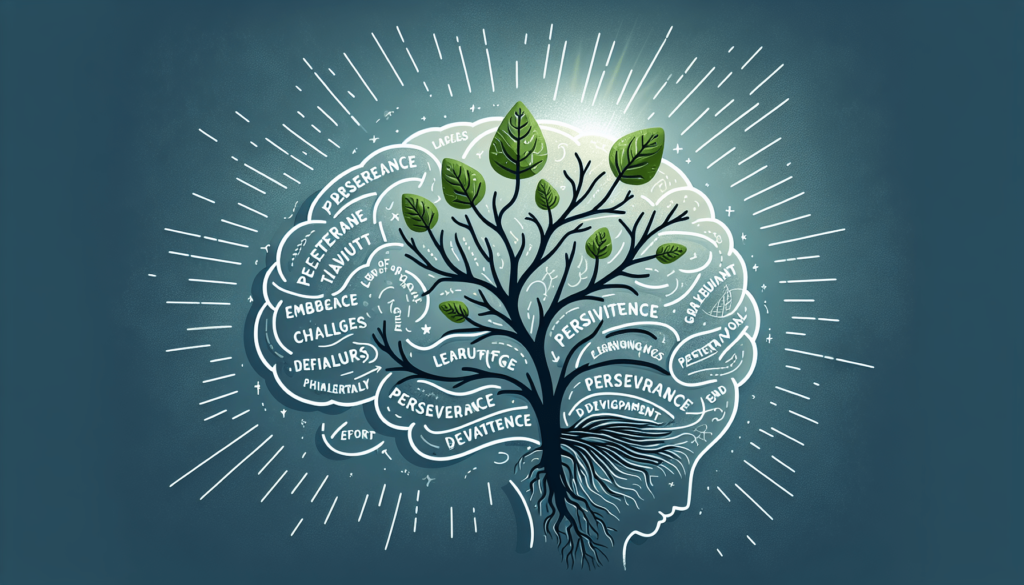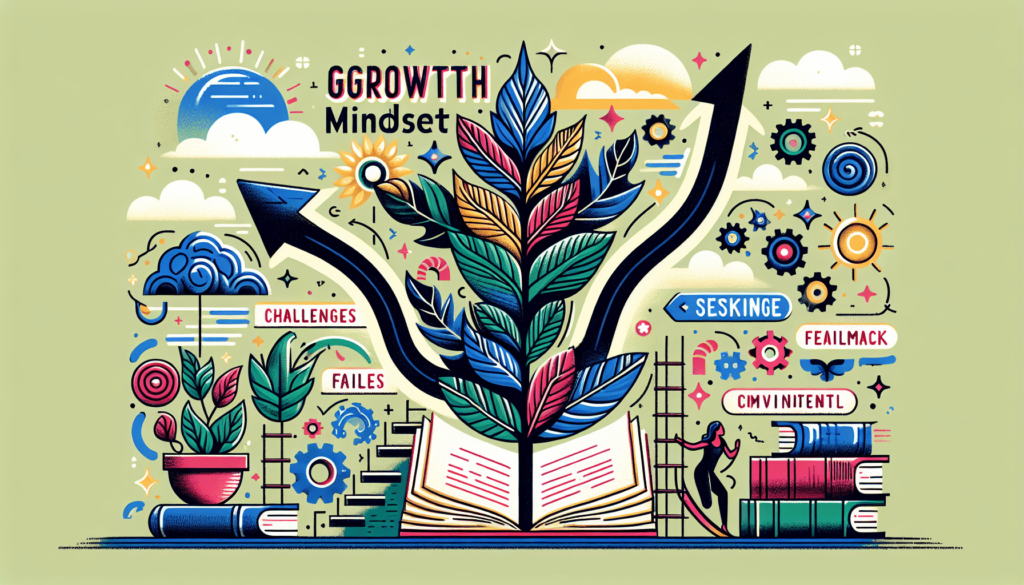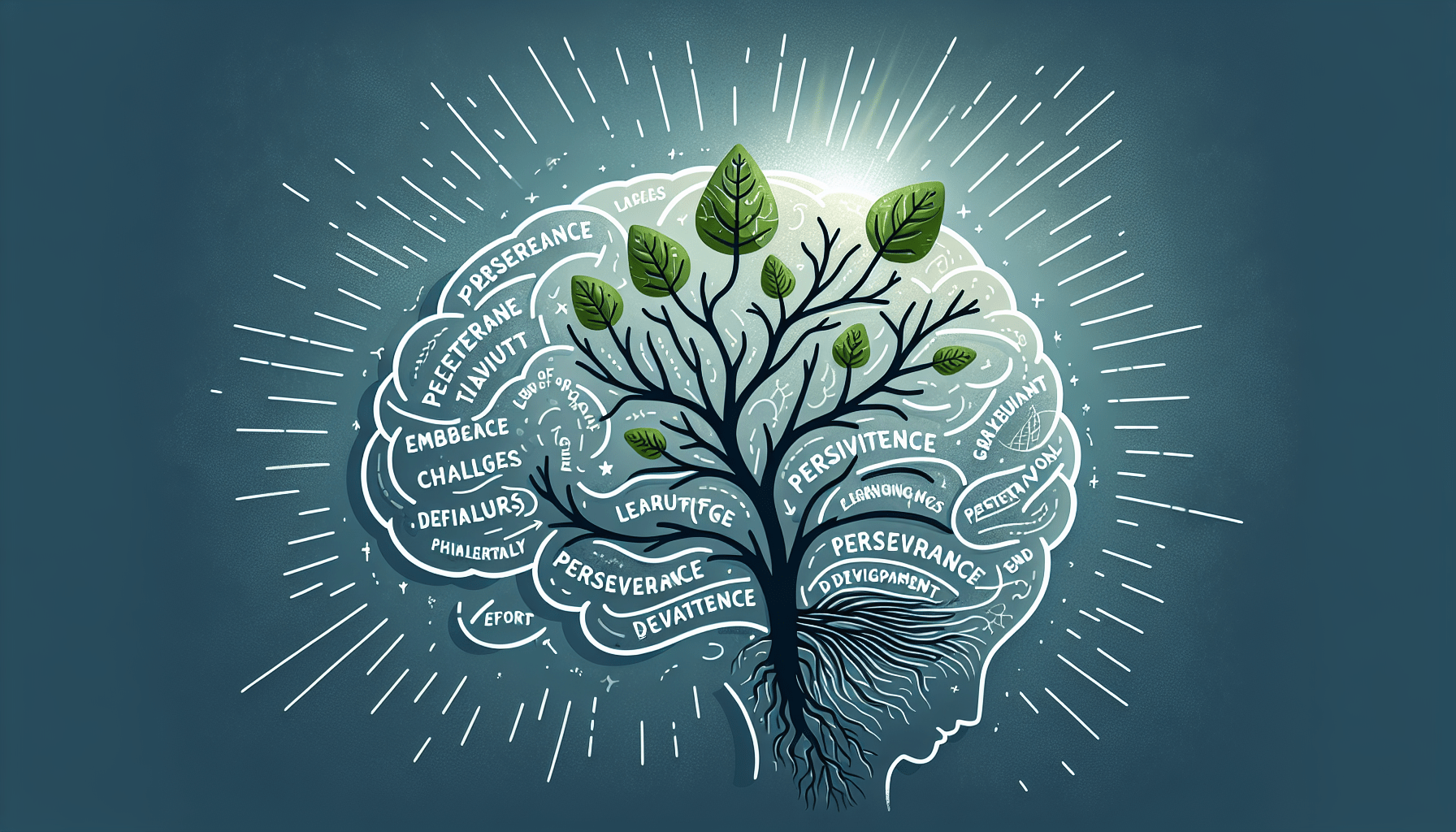A Guide To Developing A Growth Mindset
Are you eager to unlock your full potential and achieve personal growth? Look no further than this comprehensive guide on developing a growth mindset. In this article, you will discover valuable insights, practical tips, and proven strategies to cultivate a growth mindset. By shifting your perspective and embracing challenges as opportunities for growth, you can unlock a world of possibilities. Let’s embark on this transformative journey together and unleash your true potential.

Understanding the Growth Mindset
The growth mindset is a valuable framework for personal development and success. It is a belief system that embraces the idea that talents and abilities can be cultivated through effort, dedication, and learning. People with a growth mindset see challenges, setbacks, and criticisms as opportunities to learn, improve, and ultimately achieve their goals.
In contrast to the growth mindset, the fixed mindset is a belief that intelligence, talents, and abilities are fixed traits that cannot be changed or developed. Individuals with a fixed mindset tend to avoid challenges, give up easily in the face of obstacles, ignore feedback and criticism, and feel threatened by the success of others. This limiting belief can hinder personal growth and prevent individuals from reaching their full potential.
Developing a growth mindset is crucial for personal and professional growth as it allows individuals to embrace challenges, persist in the face of adversity, and seek continuous improvement. By understanding and adopting a growth mindset, individuals can unlock their full potential and achieve greater success and fulfillment in various aspects of their lives.
Recognizing the Characteristics of a Growth Mindset
Embracing challenges
People with a growth mindset embrace challenges as opportunities for growth and learning. They understand that stepping out of their comfort zone and taking on new challenges is necessary for personal development. Rather than viewing challenges as daunting obstacles, those with a growth mindset see them as a chance to learn, develop new skills, and achieve mastery.
Persisting in the face of obstacles
A growth mindset equips individuals with the resilience and determination to persevere in the face of obstacles. Instead of giving up when faced with setbacks, those with a growth mindset see them as temporary hurdles to overcome. They understand that setbacks are a natural part of the learning process and are essential for personal growth and development.
Seeing effort as a path to mastery
One of the key characteristics of a growth mindset is viewing effort as a critical component of success. People with a growth mindset understand that effort is necessary for skill development and achieving mastery. They embrace the idea that hard work, dedication, and practice are what lead to progress and improvement.
Using setbacks as opportunities for learning
Those with a growth mindset view setbacks as opportunities for learning and growth rather than as failures. They understand that mistakes and failures provide valuable insights and feedback that can help them refine their strategies and approaches. Instead of dwelling on their failures, they use them as stepping stones on their path to success.
Valuing feedback and criticism
Individuals with a growth mindset welcome feedback and criticism as opportunities to learn and improve. They understand that receiving constructive feedback allows them to gain new perspectives, identify areas for growth, and make necessary adjustments to their approach. Rather than taking feedback personally, those with a growth mindset see it as a valuable tool for growth and development.
Embracing the success of others
A growth mindset involves celebrating and embracing the success of others. Instead of feeling threatened or envious, those with a growth mindset see the success of others as inspiration and evidence that growth and achievement are possible. They understand that the success of others does not diminish their own potential but rather serves as a reminder of what is achievable through dedication and hard work.
Changing Your Beliefs and Mindset
Identifying and challenging fixed mindset beliefs
To develop a growth mindset, it is essential to identify and challenge the fixed mindset beliefs we may hold. This requires self-reflection and a willingness to question our own assumptions and limitations. By recognizing and challenging these fixed mindset beliefs, we open ourselves up to the possibility of growth and personal development.
Understanding the power of neuroplasticity
Neuroplasticity refers to the brain’s ability to change and rewire itself based on experiences and learning. Understanding the concept of neuroplasticity is crucial in developing a growth mindset, as it emphasizes the idea that our abilities are not set in stone but can be developed and improved over time through intentional effort and practice.
Adopting a growth mindset through self-reflection
Developing a growth mindset requires regular self-reflection and introspection. It involves examining our thoughts, attitudes, and beliefs about our abilities and potential. By challenging negative or limiting self-talk and replacing it with more empowering and growth-oriented thoughts, we can gradually adopt a growth mindset.
Cultivating self-compassion and self-care
In the journey to developing a growth mindset, it is important to cultivate self-compassion and practice self-care. Recognizing that setbacks and challenges are part of the learning process and being kind to ourselves in times of difficulty can help maintain a positive mindset and foster resilience. Taking care of our physical and emotional well-being is also crucial for maintaining a growth-oriented mindset.
Setting Goals and Building Resilience
Setting realistic and achievable goals
Setting goals that are realistic and achievable is essential for maintaining motivation and measuring progress. By setting specific, measurable, attainable, relevant, and time-bound (SMART) goals, individuals can have a clear direction and a roadmap for their growth and development. Realistic goals that push individuals out of their comfort zone but are still within reach can fuel motivation and instill a sense of accomplishment.
Breaking goals into manageable steps
Breaking larger goals into smaller, manageable steps helps individuals overcome overwhelm and tackle challenges more effectively. By breaking goals down into actionable tasks, individuals can focus on one step at a time, making progress towards their larger goal more attainable. This approach also allows for a sense of achievement and continuous momentum in the journey towards personal growth.
Creating a growth-oriented action plan
A growth-oriented action plan involves identifying the specific actions and strategies required to achieve desired outcomes. By outlining a clear plan of action and breaking it down into smaller milestones, individuals can track their progress, make necessary adjustments, and stay committed to their growth journey. A well-defined action plan serves as a roadmap, providing direction and purpose in the pursuit of personal development.
Building resilience and bouncing back from setbacks
Resilience is a key characteristic of individuals with a growth mindset. Building resilience involves developing the ability to bounce back from setbacks, adapt to changes, and maintain optimism in the face of adversity. It is about recognizing that setbacks and challenges are temporary and using them as opportunities for growth and learning. Developing resilience requires cultivating a positive mindset, seeking support when needed, and focusing on solutions rather than dwelling on problems.

Developing a Learning Mindset
Emphasizing the process over the outcome
A learning mindset focuses on the process of learning rather than solely on the outcome. It involves valuing the journey of acquiring knowledge and skills, rather than fixating on immediate results or achievements. By shifting our focus from the end product to the steps along the way, we can embrace the learning process, celebrate small wins, and maintain motivation throughout our growth journey.
Seeking new knowledge and skills
Developing a growth mindset involves actively seeking out opportunities to learn and acquire new knowledge and skills. It is about being curious, open-minded, and eager to expand our understanding and abilities. By seeking out new experiences, taking on challenges, and pursuing learning opportunities, we can continually grow and evolve.
Embracing curiosity and asking questions
Curiosity fuels a growth mindset. It involves asking questions, seeking answers, and exploring new ideas. Embracing curiosity allows us to approach situations with a sense of wonder and an eagerness to learn. By asking questions and seeking deeper understanding, we can gain valuable insights and expand our knowledge.
Experimenting and embracing trial and error
A learning mindset is characterized by a willingness to experiment and embrace trial and error. It involves stepping outside of our comfort zones and trying new approaches. By being open to making mistakes and learning from them, we can refine our strategies, cultivate resilience, and ultimately achieve greater success.
Continuous learning and improvement
A growth mindset is one that recognizes that learning is a lifelong process. It involves a commitment to continuous learning and improvement. Individuals with a growth mindset understand that knowledge and skills can always be enhanced and expanded upon. By adopting a mindset of continuous learning, individuals can stay adaptable, relevant, and constantly evolve in a rapidly changing world.
Cultivating a Positive and Growth-Oriented Environment
Surrounding yourself with growth-minded individuals
The people we surround ourselves with can have a significant impact on our mindset and beliefs. To cultivate a growth-oriented environment, it is essential to surround ourselves with individuals who also have a growth mindset. Being in the company of growth-minded individuals can provide support, inspiration, and motivation on our own growth journey.
Seeking support and feedback from others
Seeking support and feedback from others is crucial in developing a growth mindset. It involves being open to constructive criticism, valuing the perspectives of others, and actively seeking input on our progress and performance. By embracing feedback, we can gain new insights, identify blind spots, and make necessary adjustments to our approach.
Creating a supportive and encouraging atmosphere
Creating a supportive and encouraging atmosphere is essential for cultivating a growth mindset. This involves fostering an environment where individuals feel safe to take risks, make mistakes, and learn from them. By offering praise and encouragement, celebrating efforts and achievements, and providing constructive feedback, we can create an atmosphere that fosters growth and development.
Breaking free from comparison and competition
Comparison and competition can hinder personal growth and development. To cultivate a growth mindset, it is important to break free from the trap of constantly comparing ourselves to others and competing for validation. By focusing on our own progress, celebrating our unique strengths, and supporting others in their growth journey, we can foster an environment that encourages collaboration and mutual growth.
Celebrating progress and small victories
Acknowledging and celebrating progress, no matter how small, is essential in maintaining a growth mindset. By recognizing our efforts and accomplishments, we can stay motivated and inspired to continue our growth journey. Celebrating small victories also helps build confidence, reinforces positive behaviors, and creates a positive cycle of growth and achievement.
Overcoming Challenges and Obstacles
Developing problem-solving skills
Developing problem-solving skills is essential for overcoming challenges and obstacles. It involves a proactive approach to identifying solutions and taking decisive action. By developing our problem-solving skills, we can navigate obstacles more effectively, find creative solutions, and maintain a growth mindset even in the face of adversity.
Embracing failure as an opportunity to learn and grow
Failure is an inevitable part of the growth process. Instead of viewing failure as a sign of incompetence or a reason to give up, those with a growth mindset see it as an opportunity to learn and grow. By reframing failure as a stepping stone to success, we can bounce back from setbacks, refine our strategies, and develop resilience.
Adopting a positive mindset towards challenges
Maintaining a positive mindset when faced with challenges is crucial for maintaining a growth-oriented mindset. By approaching challenges with optimism and reframing them as opportunities for growth, we can overcome obstacles more effectively and maintain motivation. A positive mindset allows us to stay focused on solutions rather than dwelling on problems.
Persisting and being resilient in the face of adversity
Persistence and resilience are key factors in overcoming challenges and obstacles. When faced with difficult situations, those with a growth mindset persevere, adapt, and remain determined. They do not let setbacks or failures define them but instead see them as opportunities to learn and improve. By developing resilience, individuals can navigate adversity, maintain motivation, and continue their growth journey.
Practicing Self-Reflection and Self-Evaluation
Regularly reflecting on your own mindset and beliefs
Developing a growth mindset requires regular self-reflection and introspection. It involves examining our thoughts, attitudes, and beliefs about our abilities and potential. By regularly reflecting on our own mindset and beliefs, we can identify any fixed mindset tendencies and challenge them with more growth-oriented thoughts and perspectives.
Identifying areas for growth and improvement
Self-reflection also allows us to identify areas for growth and improvement. By honestly assessing our strengths and weaknesses, we can identify areas where we can make meaningful progress. Recognizing areas for growth helps us set specific goals and direct our efforts and resources towards continuous improvement.
Setting self-evaluation criteria
Setting self-evaluation criteria is a powerful tool for personal growth. By establishing measurable and specific benchmarks, individuals can assess their progress and track their growth. Self-evaluation criteria can be based on personal goals, skill acquisition, or specific areas of development. Regularly evaluating ourselves against these criteria helps us stay accountable and motivated.
Developing self-awareness and self-adjustment
Developing self-awareness is a crucial aspect of cultivating a growth mindset. Self-awareness involves a deep understanding of our strengths, weaknesses, thought patterns, and behaviors. By becoming aware of our own tendencies and biases, we can make conscious adjustments to our mindset and behaviors, aligning them with a growth-oriented approach to life.
Building a Growth Mindset in Children and Students
Fostering a love for learning
To build a growth mindset in children and students, it is important to foster a love for learning. This involves creating an environment that encourages curiosity, exploration, and a passion for knowledge. By creating a love for learning, children and students develop a natural inclination towards growth and continuous improvement.
Encouraging effort and perseverance
Effort and perseverance are essential values to instill in children and students. By praising effort rather than focusing solely on outcomes, we reinforce the idea that hard work and dedication lead to growth and success. Encouraging perseverance teaches children and students the importance of resilience and not giving up when faced with challenges.
Teaching the power of yet
Teaching the concept of “yet” is a powerful way to cultivate a growth mindset in children and students. The idea behind “yet” is that even if they haven’t mastered a skill or achieved a goal yet, with effort and practice, they can eventually get there. By emphasizing the power of yet, we encourage a mindset that values progress and continuous improvement.
Providing constructive feedback and praise
Constructive feedback and praise are effective tools for building a growth mindset in children and students. Providing specific feedback that focuses on effort, progress, and areas for improvement helps them understand that mistakes and setbacks are a part of the learning process. Balancing constructive feedback with genuine praise and acknowledgement further reinforces a growth-oriented mindset.
Promoting a growth mindset in the classroom
Creating a classroom environment that promotes a growth mindset involves structuring activities and assignments that prioritize effort, growth, and learning. Setting goals, providing opportunities for collaboration and reflection, and reinforcing the idea that mistakes and failures are opportunities for growth can help shape a classroom culture that nurtures and supports a growth mindset.
Maintaining and Nurturing a Growth Mindset
Consistently practicing a growth mindset
Maintaining a growth mindset requires consistent practice and reinforcement. It involves actively challenging fixed mindset beliefs, seeking opportunities for growth, and cultivating a positive mindset. By consistently practicing a growth mindset, individuals can reinforce their growth-oriented beliefs and adaptability in various aspects of their lives.
Overcoming setbacks and challenges
Setbacks and challenges are inevitable in life. To maintain a growth mindset, it is important to approach setbacks and challenges with resilience and a positive attitude. By viewing setbacks as opportunities for growth, learning, and refinement, we can bounce back more effectively and continue on our growth journey.
Seeking inspiration and motivation
Maintaining a growth mindset can sometimes be challenging, especially during times of adversity or when progress feels slow. Seeking inspiration and motivation from various sources can help reignite our passion for growth. Whether it’s through reading books, listening to podcasts, or connecting with like-minded individuals, seeking inspiration can help fuel our growth journey.
Continuing personal and professional development
A growth mindset is not static but constantly evolving. To nurture and maintain a growth mindset, it is essential to continue personal and professional development. This can involve seeking out new learning opportunities, attending workshops or seminars, pursuing further education, or seeking mentorship. By investing in our own growth, we can continuously expand our abilities and reach new levels of success.
Cultivating a sense of purpose and passion
Cultivating a sense of purpose and passion is a key aspect of maintaining a growth mindset. When we have a clear vision of what we want to achieve and are passionate about our goals, it becomes easier to maintain a growth-oriented mindset. By continuously aligning our actions with our values and passions, we can remain motivated, focused, and committed to our growth journey.
In conclusion, developing and maintaining a growth mindset is a lifelong journey that requires self-reflection, perseverance, and a commitment to continuous learning and improvement. By recognizing and challenging fixed mindset beliefs, embracing challenges, seeking new knowledge, and creating a supportive environment, individuals can cultivate a growth mindset that unlocks their full potential and leads to greater personal and professional success.







